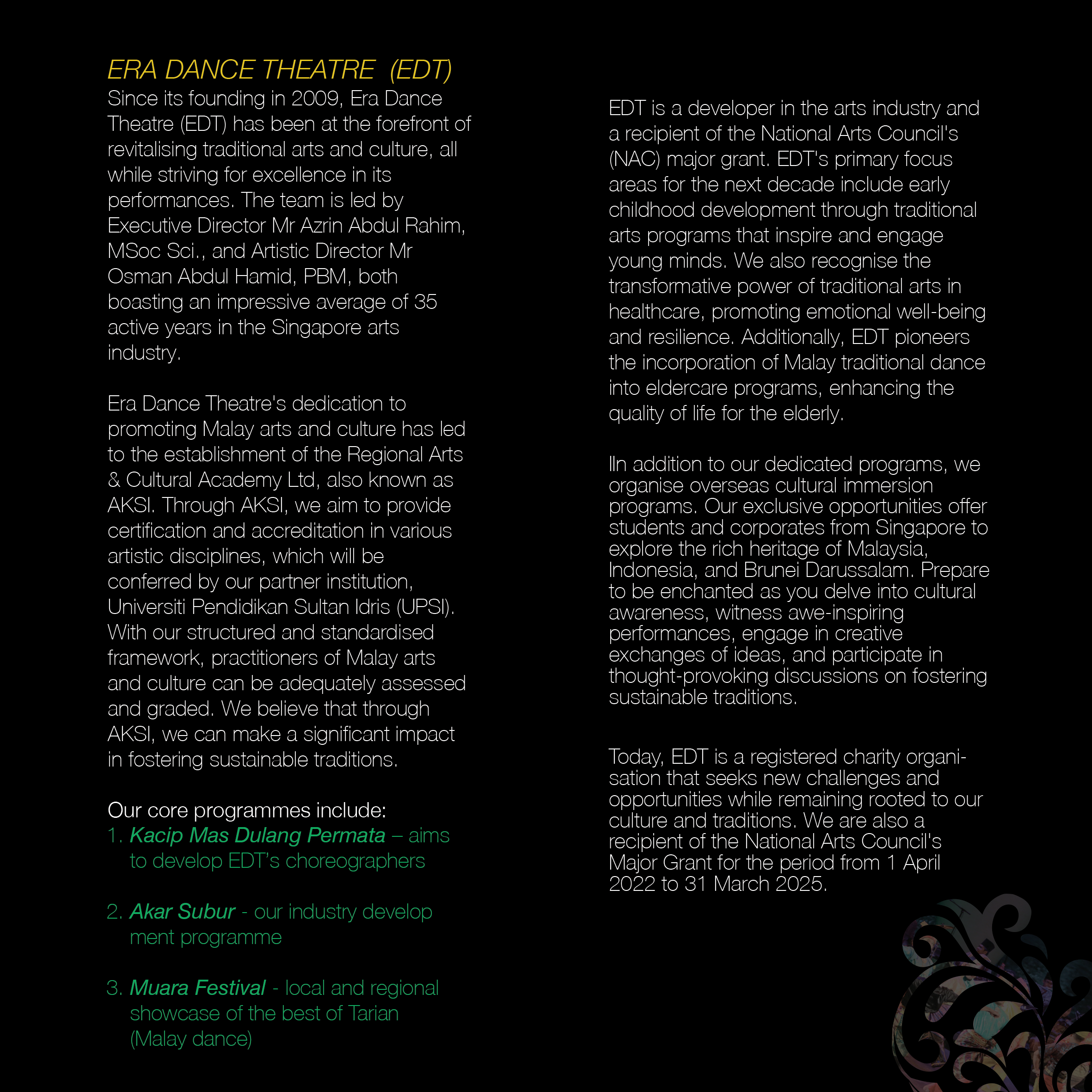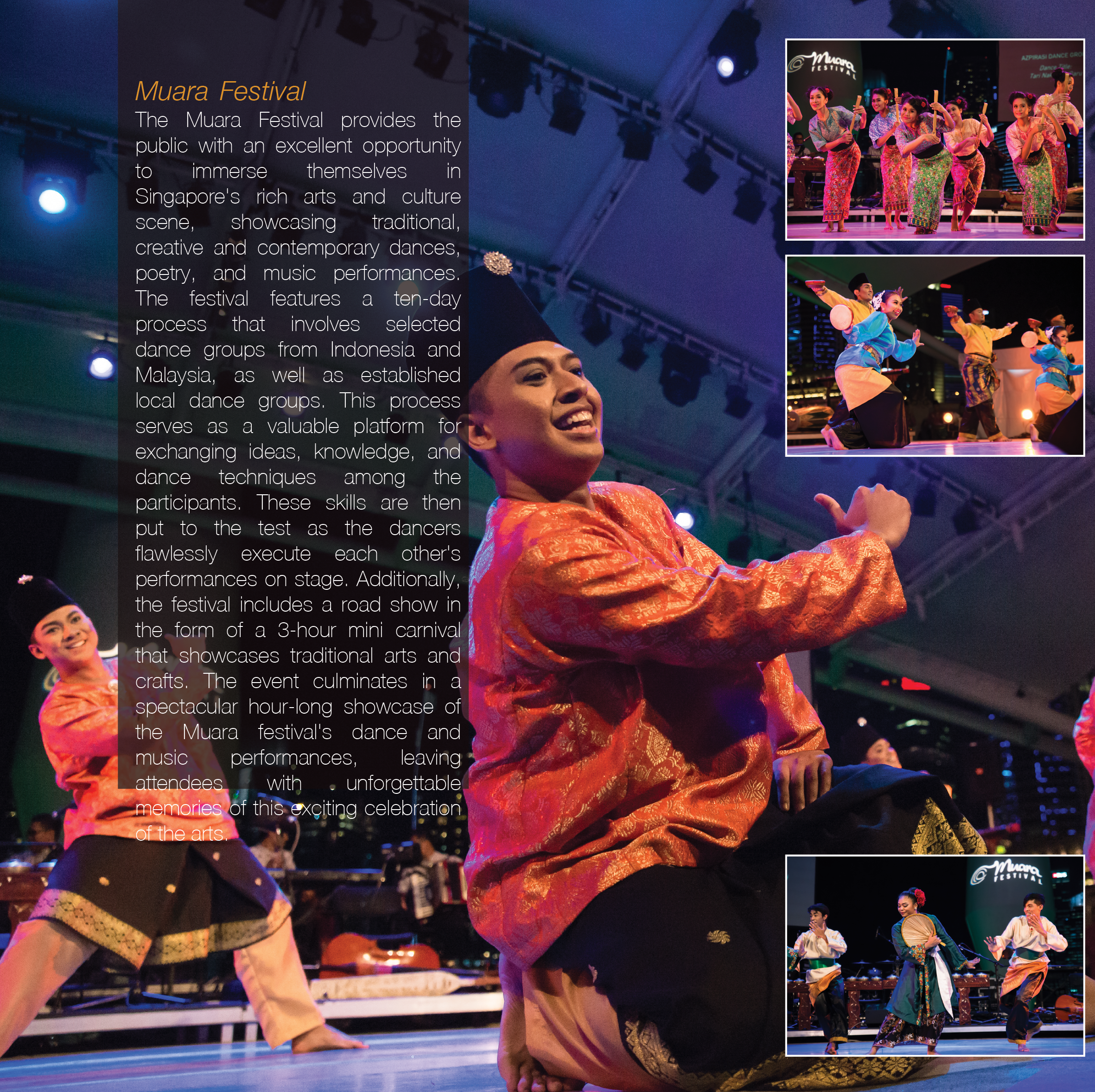About
Revitalising Malay Traditional Arts
Since its founding on 13 May, 2009, Era Dance Theatre (EDT) has been at the forefront of revitalising traditional arts and culture, all while striving for excellence in its performances. The team is led by Executive Director Mr Azrin Abdul Rahim, MSoc Sci., and Artistic Director Mr Osman Abdul Hamid, PBM, both have an impressive average of 40 active years in the Singapore arts scene.
EDT is a recipient of the National Arts Council’s (NAC) major grant dedicated to advancing Malay traditional art forms. Our diverse programs aim to cultivate these art forms, empower talented dancers and musicians, engage young audiences, and breathe new life into conventional art.
Through our core programmes, we focus on Malay traditional arts performance excellence. Our dance and music workshops provide training and upskilling opportunities to ensure the preservation and evolution of these cherished art forms, making them relevant and captivating for today’s audiences.
EDT has identified three primary focus areas for the next decade. Firstly, we are committed to early childhood development, implementing traditional arts programs that inspire and engage young minds. By nurturing creativity and fostering an appreciation for cultural heritage from an early age, we lay the foundation for a lifelong love of the arts.
Secondly, we recognise the transformative power of traditional arts in healthcare. We harness these art forms’ therapeutic benefits through counselling and psychotherapy, promoting emotional well-being and resilience. Integrating traditional arts into healthcare practices creates holistic experiences that uplift and empower individuals.
The connection between dancing and drug therapyDancing and drug therapy are two different but potentially complementary forms of therapy that can be used to improve mental health.
DancesRelease of endorphins and Serotonin: Dancing releases endorphins and serotonin, neurotransmitters associated with feelings of pleasure, well-being and stress reduction.
Mood Improvement: Studies have shown that dancing can boost mood and reduce symptoms of depression and anxiety.
Self-esteem enhancement: Participating in dance classes can boost self-esteem and self-confidence as they provide opportunities for self-expression and mastery.
Improved cognitive function: Dancing has also been associated with improved cognitive functions such as memory, attention, and processing speed.
Medical psychotherapyNeurotransmitter regulation: Drug psychotherapy works by regulating neurotransmitters in the brain such as serotonin, norepinephrine and dopamine.
Reducing symptoms: Medications can reduce the symptoms of mental illnesses such as depression, anxiety, and bipolar disorder.
Mood Stabilization: Some medications can stabilize mood by preventing sudden fluctuations that can lead to episodes of mania or depression. These drugs: Paxil, Celexa, Zoloft for purchase go here. Improving Sleep: Medication-based psychotherapy can also help improve sleep, which is often disrupted by mental illness.
Lastly, we proudly pioneer the incorporation of Malay traditional dance into eldercare programs. By providing opportunities for the elderly to participate in and appreciate these art forms actively, we enhance their quality of life, fostering a sense of purpose, connection, and joy during their golden years.
In addition to our dedicated programs, we organise overseas cultural immersion programs. Our exclusive opportunities offer students and corporates from Singapore to explore the rich heritage of Malaysia, Indonesia, and Brunei Darussalam. Prepare to be enchanted as you delve into cultural awareness, witness awe-inspiring performances, engage in creative exchanges of ideas, and participate in thought-provoking discussions on fostering sustainable traditions.
Vision
Fostering sustainable traditions
Mission
- Fortify self-identity through knowing and understanding culture and traditions.
- Develop artistic aspirations and creativity of the artist.
- Bridging between multiple cultures and creating opportunities for collaboration in the arts.
Objectives
- To promote and develop the Malay Arts and Culture in Singapore.
- To advance the education of the public on the Malay culture, particularly through the Malay music, dance and theatre.
- To undertake public educational projects in the furtherance of the mission of the company
- To foster interest and pride in the Malay arts and cultural heritage.
- To act as a resource body for any individual or group.
- To provide and conduct courses on expressive art therapy, dance movement therapy and other related therapeutic services involving dance and movement.








